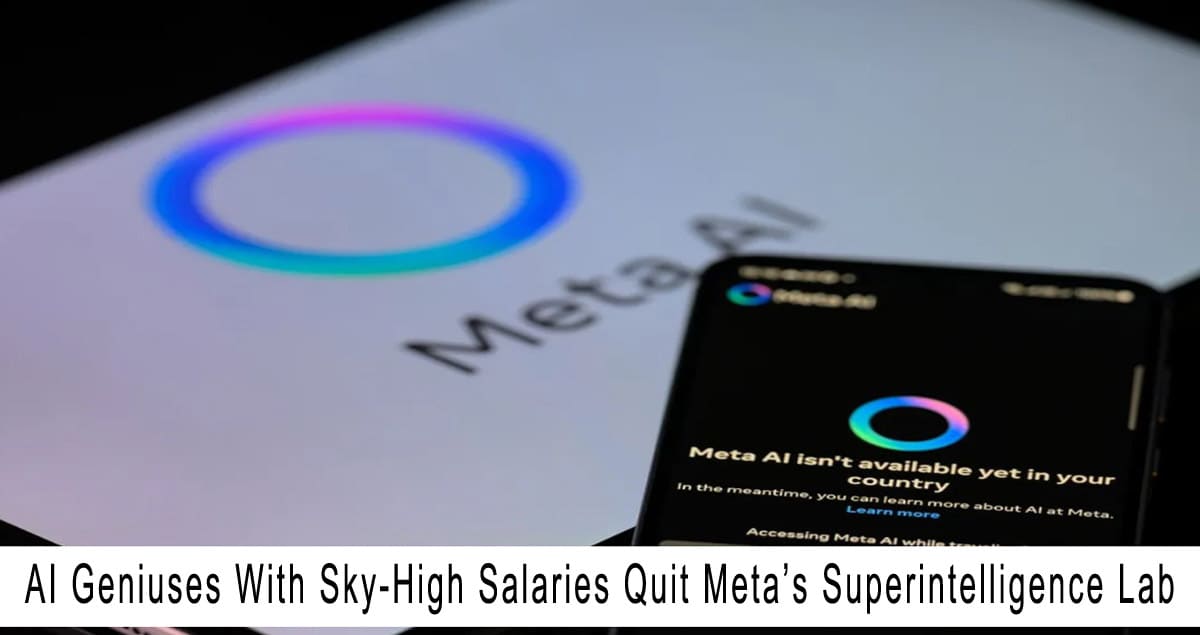
AI Geniuses With Sky-High Salaries Quit Meta’s Superintelligence Lab
AI Geniuses With Sky-High Salaries Quit Meta’s Superintelligence Lab – Meta is back in the spotlight—again. Just a few months after launching its ambitious Superintelligence Lab, a project designed to push the boundaries of AI research and rival giants like OpenAI and Google DeepMind, the company is facing a surprising wave of departures. https://wearegntlmen.com
Several of the world’s top AI researchers, the very people Meta had lured in with jaw-dropping salaries and stock packages, have walked away. The news has left many observers scratching their heads: why would AI geniuses with sky-high salaries abandon one of the most prestigious projects in tech?
AI Geniuses With Sky-High Salaries Quit Meta’s Superintelligence Lab :
Who’s Leaving the Lab?
According to a Wired report in September 2025, at least three senior AI scientists have resigned from Meta’s Superintelligence Lab in the past two months. While their names haven’t been disclosed publicly, insiders say these researchers played key roles in advancing large-scale generative AI models—the kind of systems driving everything from chatbots to multimodal assistants.
What makes the situation even more shocking is that some of them had just left competitors like DeepMind and OpenAI for Meta earlier this year. Their tenure at Meta turned out to be short-lived, raising questions about whether the company’s grand plans are sustainable.
Sky-High Salaries, Short-Term Loyalty
Let’s talk numbers, because they’re staggering. Wired reported that certain researchers at Meta’s lab received nine-figure compensation packages—that’s hundreds of millions of dollars when you combine base salary, bonuses, and equity.
Converted into other currencies, we’re talking trillions of rupiah, or generational wealth by any standard. For most of us, that sounds like a dream job you’d never leave. But here’s the twist: the promise of wealth wasn’t enough to keep these minds around.
So why walk away from a golden throne? The main reasons whispered by insiders include:
- Restrictive internal policies that limited freedom to experiment.
- Unrealistic targets, especially Meta’s push to achieve Artificial General Intelligence (AGI) sooner than many believe possible.
- Severe stress and pressure brought on by Meta’s ambitious plan.
In other words, money alone couldn’t offset the daily grind.
Meta’s Official Response
Meta, of course, isn’t panicking publicly. Company spokesperson Dave Arnold played down the resignations, describing them as a typical step in the hiring process.
“When you recruit at this scale and speed, turnover in the early stages is expected,” he told Wired.
The message was clear: Meta doesn’t see this as a crisis, at least not officially. But critics argue that losing top talent so early suggests deeper cultural and structural challenges.
Why This Matters to the AI Community
For the average reader, this might look like just another tech drama about wealthy researchers switching jobs. But for people deeply involved in AI, the story signals bigger issues worth unpacking:
- Stability of Meta’s superintelligence project. Is Meta’s goal of being at the forefront of the AGI race sustainable if the best minds don’t want to stay?
- Talent reshuffling across the ecosystem. These researchers won’t disappear—they’ll likely move to startups, independent labs, or open-source initiatives. Their exit could spark ripple effects in global AI development.
- Cultural warning signs. Ambition is good, but if a lab’s internal culture pushes talent away, even billions in funding won’t guarantee success.
The Bigger Picture: Beyond Money
The saga reveals a truth that often gets buried in headlines about massive salaries: in AI research, money is never the whole story.
For world-class scientists, priorities like intellectual freedom, clarity of vision, and a healthy work environment matter more than the number of zeroes in their paycheck. Without these, even a nine-figure contract can feel hollow.
For Meta, the challenge is clear: it’s not just about attracting geniuses with money. It’s about retaining them, empowering them, and building an environment where innovation can thrive. Otherwise, the dream of “superintelligence” runs the risk of being reduced to yet another costly experiment.
Lessons for the Industry
What can we learn from Meta’s situation?
- Talent retention > talent acquisition. Poaching big names is flashy, but long-term retention builds real momentum.
- Culture matters as much as compensation. Researchers want freedom to explore, not just big paychecks.
- Vision needs grounding. Ambitious promises around AGI are exciting, but they must align with practical, achievable milestones.
Conclusion
The exodus of AI geniuses from Meta’s lab is more than a headline—it’s a wake-up call for the entire industry. If Meta, with its vast resources and near-limitless budgets, can’t hold on to its brightest minds, what does that say about the challenges of building superintelligence?
The lesson is simple: you can’t buy innovation. You can only foster it. For the future of AI, that might be the most important takeaway of all.




